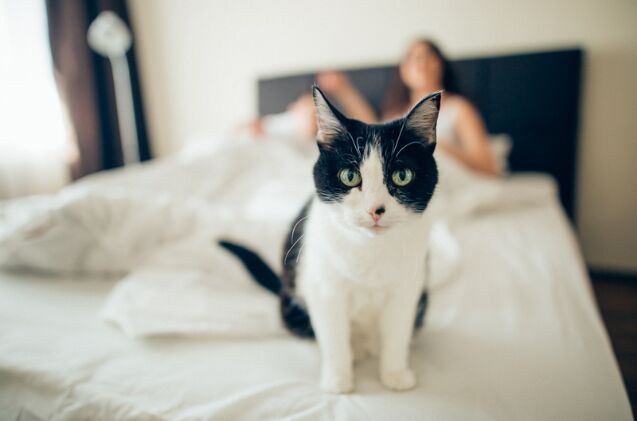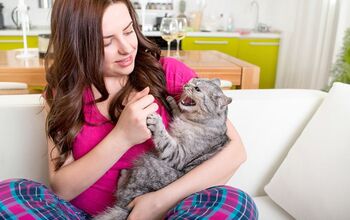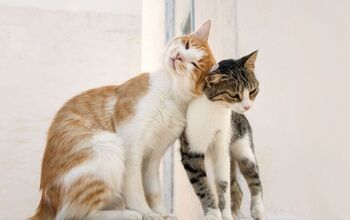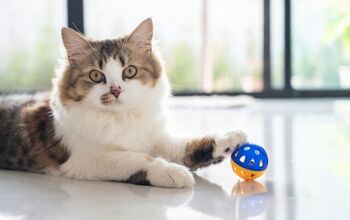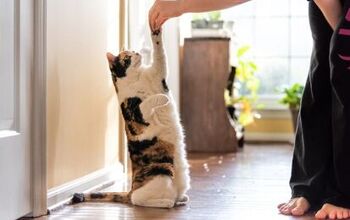How Do I Stop My Cat From Waking Me up at Night?

As cat parents, we all love our feline family members. But that love doesn’t erase the frustration that comes with your cat turning into a furry alarm clock at precisely 3 am every morning. Why are they even up at that hour?
In this article, we’ll address exactly that—the reasons for your cat’s nighttime activities and the steps you can take to reclaim your sleep once and for all.
Let’s not waste any time…
Why Does My Cat Wake Me Up Every Night?
Having your sleep disturbed by your cat every night can be frustrating. But before you get upset with your furry friend, consider asking yourself why. Why are they waking you up? Why are they unable to settle in? There is a possibility that this could be your cat’s way of asking for or alerting you to something important.
Here are a few of the more common reasons:
Pain or Medical Problems
This is most common in cats that once used to settle in fine and are now changing their nighttime routine. If your cat is feeling “off,” whether it’s due to discomfort or pain, it may be preventing them from relaxing or sleeping at night. To rule this out, you must make an appointment with your veterinarian.
Pay careful attention to any other signs of trouble, including:
- Panting
- Changes in eating habits
- “Accidents” or failure to use their litterbox like usual
- Excessive vocalization (meowing, howling, hissing)
- Loss of interest in toys, furniture, or activities they once loved
- Overgrooming or failure to groom
- Hiding or reluctance to be handled
- Irritability or uncharacteristic aggression
When you speak with your veterinarian, explain all behavior changes or reasons for concern that you have recorded. If you're unsure, we recommend keeping a journal. This will help you spot patterns and red flags.
Feline Dementia
Cognitive Dysfunction Syndrome (CDS) in cats is similar to Alzheimer’s disease in humans. As our cats get older, one of the unfortunate age-related symptoms they suffer is a change in their mental state. They may start to act confused, seem unfamiliar with their surroundings, stare blankly into space, or struggle to follow household rules that were once deeply ingrained.
If your cat has CDS, they may vocalize loudly at night because they don’t remember where they are or can’t find you. This behavior is often a sign of feeling anxious, fearful, or stressed out. Cat parents who know they have a kitty with CDS may need to keep their cat in a contained “safe place” at night to prevent them from wandering and becoming lost, as it can be incredibly distressing for them.
Feeling Hungry
Do you have a cat that is highly food-driven? I do! Speaking from experience, an empty food dish can trigger quite a commotion. Our food-driven cat Jinx is quick to let us know when she’s hungry and doesn’t have access to something tasty. In the same way, it could also be your cat’s way of letting you know that their water dish or fountain is running low.
Lack of Daytime Activity/Stimulation
Cats require mental and physical exercise throughout their day to live a happy, healthy life. When they don’t have this, they can feel bored and exhibit “bad” behaviors like scratching furniture, tearing about the toilet paper, overgrooming, or becoming overly vocal.
Much like the cats who are trying to communicate that their food or water dishes are empty, these cats are trying to tell you that they are missing something essential in their lives. It is most common in cats living in a smaller space with few opportunities to engage in their natural behaviors, such as climbing, scratching, hunting, and hiding.
Feeling Lonely
Despite their aloof and sassy personalities, cats are actually social animals. This is why you find stray cats living in colonies. Your cat’s social needs can be met by you, other people in the house, a second cat (or third or fourth…), or even another animal, like a dog. But they need to have someone they can connect with.
Are you your cat’s person? Even if you spend a few hours focused entirely on them before heading to bed, your absence may be difficult for them. Cats can experience separation anxiety, even if the only separation is that you are in a different room, leaving them alone.
Differing Schedules
Cats are naturally most active at dawn and dusk, which is known as being crepuscular. While some cats will adjust their schedules to match their human family members a little closer, doing so goes against their natural instincts (unless you work a night shift). Other crepuscular pets include hamsters, rats, mice, rabbits, ferrets, and chinchillas.
Your cat will likely wake up to get attention or play with you throughout the day, but they will also take many naps. Our cats spend much of their day stretched out in a patch of sunshine, soaking up the warmth and recharging. In general, cats are most energetic first thing in the morning as the sun rises and again just as the average person is getting ready for bed.
Should I Ignore My Cat Meowing at Night?
One approach I have seen several times when dealing with an overly vocal cat is simply ignoring the meowing until they stop. Depending on why your cat is trying to get your attention, this may or may not be an effective solution.
If your cat is meowing to get your attention because they have learned, over time, that meowing will get them what they want (you getting out of bed to take care of them), ignoring them may work. This would essentially break the cycle, much like the parents who recommend letting a baby cry it out so they learn that they won’t be picked up every time they cry.
However, if your cat is meowing because they are trying to inform you that they are suffering from severe dental pain or because they are confused as to where they are due to CDS, ignoring them won’t help. In fact, ignoring them is failing to provide them with the care they need in these situations. That’s why it is so important to identify the root cause of your cat’s behavior.
Will My Cat Ever Stop Waking Me Up at Night?
Whether your cat’s tendency to wake you up at night will end on its own will, once again, depend on the reason for this behavior. If you have a young kitten or a cat that is just adjusting to your lifestyle, there is a chance they will learn your schedule and adjust accordingly.
For most situations, you must start by addressing the reason for your cat’s behavior. This could involve solving a problem (like medical issues), offering a positive outlet for their energy, or making adjustments to your home or lifestyle that will support your and your cat's needs.
Tips and Tricks to Stop Your Cat from Waking You Up at Night
If ignoring your cat meowing won’t work and they aren’t going to grow out of this behavior, what options do you have? Is there a solution that will work for everyone involved? Great news – there are steps you can take to create a happy and harmonious house. Here are a few suggestions:
Make a Vet Appointment
First, make sure you are ruling out any possible medical concerns. Cats are masters of hiding pain and illness. If it has reached the point that they are starting to act out or give signs that they are in discomfort, it needs to be addressed as soon as possible. Addressing the root cause, whether it’s an injury, dental problems, or illness, will allow them to return to their usual relaxed nighttime routine.
Change The Feeding Schedule
For cats on a diet or those who eat a set amount of food each day for any reason, offering more food in the middle of the night to silence them may not be an option. If that’s the case, you may need to readjust when your cat is fed. Try offering one of their meals just before bed to ensure they have a full belly.
Get an Automatic Feeder
Does feeding your cat before bed not quite cut it? If you find that this shift is simply pushing off the noise a little longer, you may need to offer another meal in the middle of the night to keep them going. Of course, getting up to put another meal out yourself defeats the purpose, right?
Try investing in a simple automatic feeder, like the Cat Mat C200 2-Meal Automatic Pet Feeder for Cats. This allows you to schedule one or two meals during the night while you’re still sleeping. If your cat eats wet food, don’t worry. A small ice pack in the bottom can keep the food cool and fresh until the timer triggers opening the flap to let them dig in.
Catify Your Home
Do you believe your cat’s excess energy at night is caused by boredom? If so, try offering more opportunities for physical activity and mental enrichment in your home. There are many different ways to meet these needs. Scheduling time into your daily routine to play with a wand toy is a great way to tire your cat out, especially if that time falls right before bed. This is also a great way to strengthen your bond.
Another great option is to incorporate a cat tree or cat shelving to offer more places for your cat to climb and explore. Try to create a space with different elements, like scratch posts, cat hammocks, condos to hide in, tunnels, or attached toys.
There are many interactive cat toys on the market that will encourage your cat to play more, even if you’re at work (or in bed). A favorite in our home for our two cats, Pippen and Jinx, is the PetSafe Peek-A-Bird Interactive Toy. It has a small sensor on the front of the toy that, when triggered, causes a small feathered wand to dance around on each side of the bird, tapping into your cat’s hunting instincts.
Create a Safe Space
If your cat is living with CDS, you may need to create a “safe space” for them. What that looks like will differ from cat to cat. For example, if a cat cries out because they are lost and can’t find you, consider setting up a playpen or soft-sided dog crate next to your bed with a litter box, food, water, and a cozy bed. If they become scared or anxious, you can reach down and pet them or speak to them calmly to comfort them. Include their favorite soft toy or bedding to surround them with familiar scents.
Another option would be to include a comfort toy like the Snuggle Kitty Heartbeat Stuffed Toy. This stuffed cat offers both heat and a heartbeat, making it feel like they are snuggling in with another cat. It’s a great way to calm your cat naturally and ease their nighttime anxiety.
Final Thoughts: Getting a Good Night’s Sleep with Cats
If you’re dreaming of sleeping through the night without a furry alarm clock, there are steps you can take. First, contact your veterinarian to rule out any potential medical problems. If you have confirmed that nothing is happening medically, you can start focusing on creating a home situation that caters to both you and your cat.
Depending on the reason for your cat’s nighttime antics, you may want to consider setting up a “safe space” for your cat to spend the night, investing in an automatic feeder or water fountain, or creating more opportunities in the home for mental and physical enrichment.
Try making a small change or two and see if that addresses the problem. Are you still being woken up at all hours? Move on to another solution until you find the one (or the combination) that works for everyone. It may take time and some trial and error, but it will be worth it in the long run!
Join the PetGuide community. Get the latest pet news and product recommendations by subscribing to our newsletter here.

Britt Kascjak is a proud pet mom, sharing her heart (and her home) with her “pack” which includes her husband John, their 2 dogs – Indiana and Lucifer – and their 2 cats – Pippen and Jinx. She has been active in the animal rescue community for over 15 years, volunteering, fostering and advocating for organizations across Canada and the US. In her free time, she enjoys traveling around the country camping, hiking, and canoeing with her pets.
More by Britt



